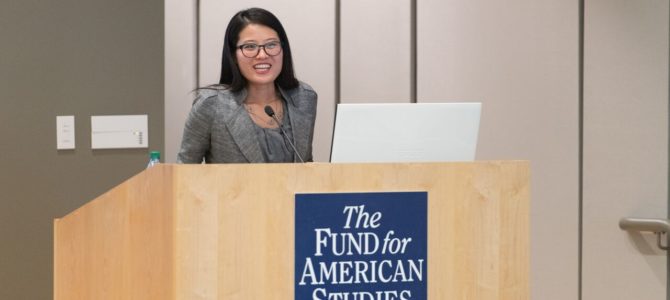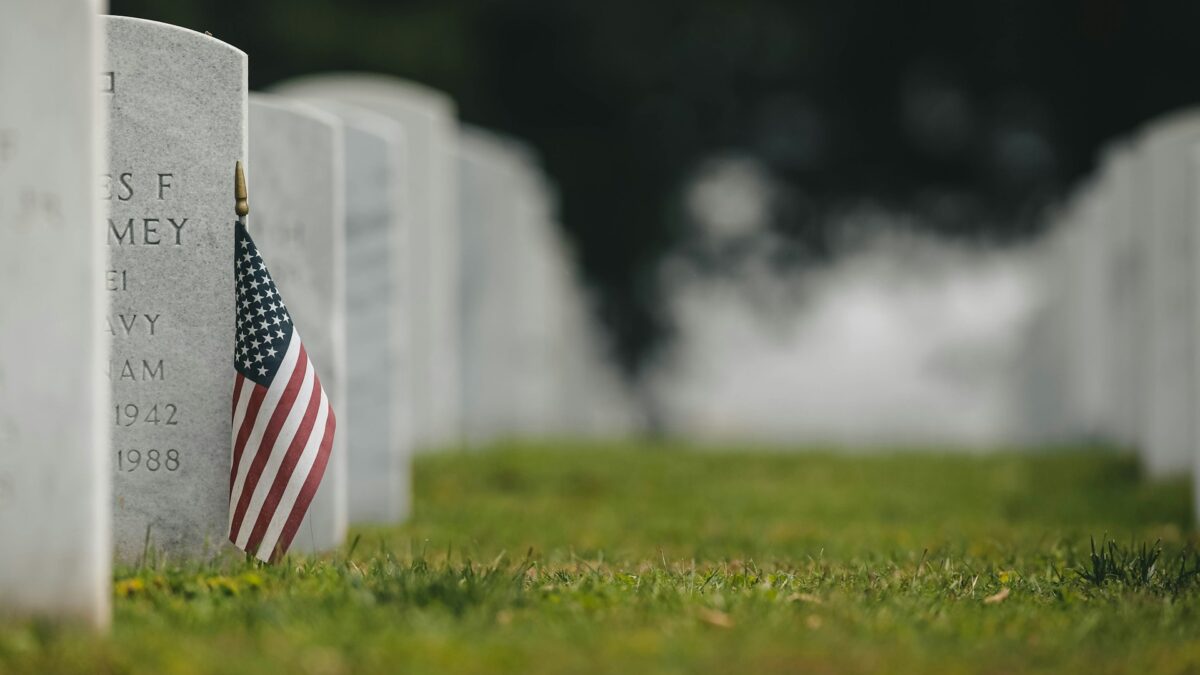
Grace Jo’s first memory of North Korea is sitting by her grandmother, selling a bucket of dried fish in the marketplace. Her grandmother raised her and her four siblings, because her parents were often gone trying to find food, whether by scavenging for wild vegetables in the mountains or by bartering, at times nearly begging, in the market.
More than two decades later, Jo told her story this week at George Mason University’s Arlington campus. The Fund for American Studies hosted the event.
“Here in America, it’s difficult to understand. You cannot imagine what life without freedom is like,” Jo said. Jo then walked the crowd through her family’s story. Her grandmother, as well as her two younger brothers, eventually succumbed to starvation in North Korea.
Her older sister went missing after going to China to find food. The Jo family doesn’t know for certain but assumes she was either forced into sex trafficking or sold as a bride to a Chinese farmer.
Her father is also dead. After realizing that there was no food for his family in his country, he made the perilous journey into China to ask for a bag of rice from relatives. On his third trip, someone reported him to government officials, who promptly arrested him.
Jo’s family heard nothing about their father for weeks, until a letter came from the North Korean government. The letter stated that Jo’s father had jumped from a train transferring him from one camp to another. The officers fatally shot him as a result. The news shocked Jo’s mother so much that she went into labor prematurely.
Afterwards, Jo’s mother doubted the statement that the government gave her. Not only was her husband weak from the lack of food, but he also had a genetic condition that made jumping from trains very unlikely.
She started asking around and found a man Jo’s father had been imprisoned with. According to his roommate, the guards beat Jo’s father every night until he passed out, and his face was covered with blood. He died as a result of the torture and malnutrition. To dodge discipline, the officials concocted the story they sent his wife.
His death left their family with no means of finding food. For 11 days, Jo and her brothers consumed nothing but cold water and laid fetal on the floor, counting the minutes go by. Feverish, they tried to ease the pain by looking for cold spots on the concrete floor.
An older woman from their community stopped by and saw their state. Although food was scarce all around, she gave the Jo family a kilogram of corn, which Jo’s mother chopped finely and boiled. That porridge was the first food they had eaten in almost two weeks.
Shortly thereafter, her mother and grandmother found six newborn mice outside. They were overjoyed and immediately began deliberating about the best way to prepare the mice. Newborn mice are a traditional North Korean remedy for malnutrition.
After her mother and grandmother had decided that they would boil the mice for a soup, they had to make the awful choice of who would get to eat them. They decided on their daughter Grace.
Although it took some coaxing to get her to eat the soup, Jo described it as “very delicious.” Served over a combination of corn porridge and white rice, it greatly improved Jo’s health. Her hair, which had become dull and yellow, regained some of its natural black color and shine.
Jo’s mother knew long-term survival was impossible in North Korea. In July 1996, she, Jo, and Jo’s sister began the journey northward to China.
It was hot and oppressively humid. The Yalu River, which creates the border between China and North Korea, was swollen from the heavy rains. The waters reached her mother’s waist and her sister’s shoulders. Jo, who was seven years old at the time, sat in a backpack on her mother’s shoulders to avoid drowning. The trip lasted an hour.
Once in China, the Jos still could not rest. North Koreans aren’t considered refugees in China and are repatriated back to North Korea if caught. There, they face almost certain death. Chinese police officers act as plain clothes civilians then arrest refugees. As a result, Jo, her mother, and sister cringed at the sound of police sirens.
Over the next decade, Jo was repatriated three times. She was imprisoned. Her mother and sister were tortured. Their saving grace was a pastor who they had met earlier. While in China, Jo and her family became involved with a Christian community. She went to a school an American pastor started for orphans. This American pastor eventually raised money for Jo and her family’s release from a North Korean prison camp.
With the $10,000 raised, he was able to bribe six North Korean officials for their freedom. Once back in China, the United Nations rescued them and let them enter the United States as legal refugees.
“We felt like came to heaven,” Jo said of the United States. “We didn’t have to fear anymore.”
Five years after that, Jo and her family became American citizens, joining 200 North Korean refugees who live in the United States. Jo, her mother, and her sister slowly stopped looking over their shoulders for plain-clothes police officers. Once, after getting pulled over, Jo’s mother yelled at her sister, afraid they would be sent back to North Korea by the American officer. Jo’s sister was startled at first, then started laughing uncontrollably.
“Mom, you don’t have to be afraid anymore,” Jo’s sister said. “This is America.”
After the officer ran their license and registration and let them go, Jo’s mother was stunned. “I guess this is what freedom is,” she said. The idea that one could interact with the police without the fear of violence or the need for bribes shocked them.
Now as American citizens, they are advocating for North Korean refugees still stuck in China. The Jo family founded the nonprofit NKinUSA, which funds rescue missions in China. Jo is the vice president. According to Jo, it costs about $3,000 to bring a refugee to safety. Since 2012, NKinUSA has helped 98 refugees.
Her activism hasn’t stopped there. She was a guest at the U.N. Security Council’s session on North Korean human rights. She has spoken on NBC, on CBS, and at Harvard about her story.
Jo hopes to study international law, so she can fight the forced repatriation of North Korean refugees in China. In the meantime, she’s working as a dental assistant and taking classes at Montgomery College.
Her talk comes on the heels of President Trump’s summit with North Korean dictator Kim Jong Un. Jo was very disappointed with the outcomes of the meeting, which she said legitimized Kim to many in the West.
“The U.S. government did not get anything from the meeting. North Korea did,” she said.
She thought Kim’s talk of dismantling nuclear missiles distracted many from the human rights abuses that occur in the country. She said she hopes the media would focus more on the starving North Korean people than on the nuclear situation.
She wants people to remember the people sitting in prison camps, who are forced to sit at 45-degree angles for hours at a time. She wants people to advocate for her fellow Christians in China who pray silently to themselves at night because gatherings catch the attention of authorities. She wants people to know that her father lived in fear after killing a government cow to feed her family, because the punishment for that is death.
Jo began her talk by reminding her audience that they have no grasp of what life without freedom is like. Jo and her family are now working so North Koreans may one day be able to say the same thing.









